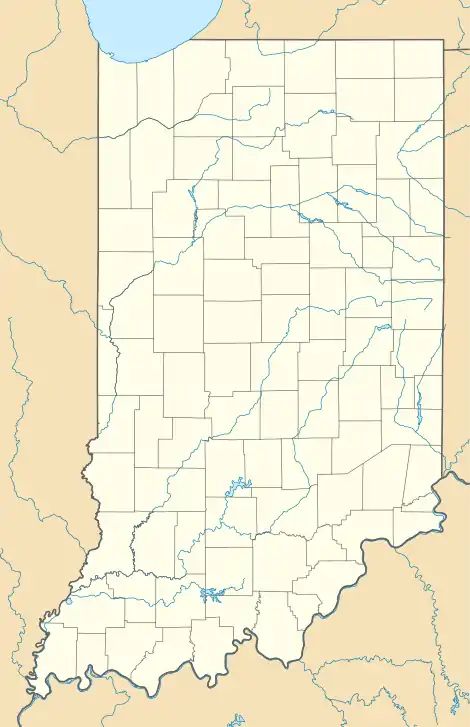Richmond, IN | ||||||||||||||||||||||||||||||||
|---|---|---|---|---|---|---|---|---|---|---|---|---|---|---|---|---|---|---|---|---|---|---|---|---|---|---|---|---|---|---|---|---|
| inter-city rail station | ||||||||||||||||||||||||||||||||
 The station in period use by the Penn Central, in May 1970 | ||||||||||||||||||||||||||||||||
| General information | ||||||||||||||||||||||||||||||||
| Location | 900 North E Street, Richmond, Indiana | |||||||||||||||||||||||||||||||
| History | ||||||||||||||||||||||||||||||||
| Opened | 1902 | |||||||||||||||||||||||||||||||
| Closed | October 1, 1979[1] | |||||||||||||||||||||||||||||||
| Former services | ||||||||||||||||||||||||||||||||
| ||||||||||||||||||||||||||||||||
Richmond Railroad Station Historic District | ||||||||||||||||||||||||||||||||
 The former Pennsylvania Railroad station in Richmond. | ||||||||||||||||||||||||||||||||
  | ||||||||||||||||||||||||||||||||
| Location | Roughly bounded by Norfolk & Southern RR tracks, N. Tenth St., Elm Pl., N. D St., & Ft. Wayne Ave., Richmond, Indiana | |||||||||||||||||||||||||||||||
| Coordinates | 39°50′3″N 84°53′26″W / 39.83417°N 84.89056°W | |||||||||||||||||||||||||||||||
| Area | 11 acres (4.5 ha) | |||||||||||||||||||||||||||||||
| Architect | Multiple | |||||||||||||||||||||||||||||||
| Architectural style | Italianate, Classical Revival, etc. | |||||||||||||||||||||||||||||||
| NRHP reference No. | 87001808[2] | |||||||||||||||||||||||||||||||
| Added to NRHP | October 8, 1987 | |||||||||||||||||||||||||||||||
The Richmond Railroad Station Historic District is a group of historic commercial buildings and national historic district located at Richmond, Wayne County, Indiana.
Historic District
The district encompasses 22 contributing buildings the icon of which is the Daniel Burnham-designed Pennsylvania Railroad Station, completed in 1902. It developed between about 1853 and 1915 and includes representative examples of Italianate, Classical Revival, and Chicago School style architecture. In addition to the Pennsylvania Railroad Station, other notable buildings include the Miller Brothers Block (1890), Jacob H. Lichtenfels Building (1890), Charles Sudhoff Building (1893), Benjamin Starr Building (1896), William H. Alford Building (1905), John Roberts Building (1877), R.F.D. Hose House No. 1 (1890), James Shaw Building (1875), and Richmond / Atlas Underwear Building (1910).[3]
The district was added to the National Register of Historic Places in 1987 and is also a local conservation district designated by the City of Richmond's Historic Preservation Commission.[2]
Railroad station
It hosted trains on north–south and east–west trajectories through eastern Indiana:
- Amtrak:
- Pennsylvania Railroad:
- American - St. Louis–New York, New York
- Buckeye - Chicago–Cincinnati, Ohio
- Indianapolis Limited - Indianapolis–New York, New York
- Northern Arrow - Mackinaw City–Cincinnati, Ohio, with sleeping car sections moved onto connecting trains to St. Louis
- Penn Texas - St. Louis–New York, New York
- Southland - Chicago–St. Petersburg, Florida/Sarasota, Florida/Miami, Florida
- Spirit of St. Louis - St. Louis–New York, New York
- St. Louisan - St. Louis–New York, New York
- Union - Chicago–Cincinnati, Ohio, and a section to Columbus via Dayton
A previous station at this same location was also a stop on the procession of Abraham Lincoln's funeral train. Indiana Governor, Oliver P. Morton, boarded the train at this stop, and rode it to Indianapolis, where a procession and showing were held.
See also
References
- ↑ "Burger Overturns Court Order Extending National Limited's Life". The Indianapolis Star. October 1, 1979. p. 6. Retrieved January 12, 2019 – via Newspapers.com.

- 1 2 "National Register Information System". National Register of Historic Places. National Park Service. July 9, 2010.
- ↑ "Indiana State Historic Architectural and Archaeological Research Database (SHAARD)" (Searchable database). Department of Natural Resources, Division of Historic Preservation and Archaeology. Retrieved July 1, 2016. Note: This includes Katherine M. Jourdan (October 1986). "National Register of Historic Places Inventory Nomination Form: Richmond Railroad Station Historic District" (PDF). Retrieved July 1, 2016., Quad map, and Accompanying photographs
External links
 Media related to Richmond station (Pennsylvania Railroad) at Wikimedia Commons
Media related to Richmond station (Pennsylvania Railroad) at Wikimedia Commons- Railroad Station Historic District photos and information from Waynet.org
- Pennsylvania Railroad, August 6, 1950 timetable

